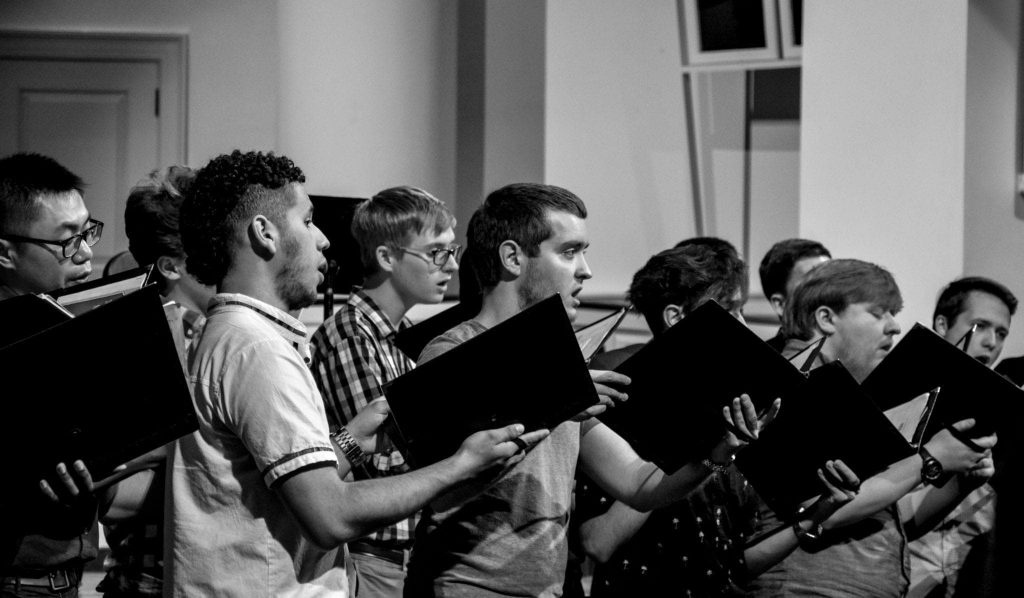Voces en Exilio symposium finds strength in music one year after Hurricane Maria
Voces en Exilio remembers Hurricane Maria

The Latin-American and Hispanic communities of Syracuse are turning to the beauty of song to help mend the wounds inflicted by Hurricane Maria.
It’s been a year since the storm devastated Puerto Rico and left thousands of people dead and without shelter. Much of the island still doesn’t have access to electricity and clean drinking water. Despite these challenges, the people of Puerto Rico are showing their resilience in rebuilding their homeland.
The City of Syracuse is sending its support in another way.
La Casita Cultural Center – a branch of Syracuse University’s College of Arts and Sciences – hosted a memorial and remembrance of those affected by the storm Thursday, Sep. 20.
“Voces en Exilio” (Voices in Exile) delivered a powerful message of community, solidarity and strength through song and first-hand accounts of the struggle caused by Maria. The event included performances by well-known musicians and vocalists at SU.
Professional Venezuelan vocalist and instructor Aleksandre Roderick Lorenz delivered a Spanish-language cover of Leonard Cohen’s “Hallelujah,” accompanied by cellist Mia Chou-Li Tsai. Lorenz rewrote some lyrics to frame the song as a prayer for the people of Puerto Rico. His voice echoed through the halls of La Casita as he concluded the song with a sustained “Amen.”
The duo followed with “En Mi Viejo San Juan,” a classic Puerto Rican composition written as a love letter to the island. Lorenz urged the audience to sing alongside him and the audience was more than happy to oblige. As the number came to an end, tears could be spotted running down the faces of guests throughout the crowd.
For Lorenz, music is a place of refuge for those in despair and can help make sense of tragedies such as Maria. “It doesn’t matter where you’re from in the world or what language you speak, music is a language of its own and it gives us the ability to externalize things we can’t say,” Lorenz said.
Though he isn’t Puerto Rican, Lorenz says he can relate to the feeling of living in exile. He fled his home country of Venezuela years ago and has been unable to return since. He says “San Juan” struck such a chord with the Latin-American crowd because it’s about “home.”
“You remember that city that belongs to you. That home that will always be your place,” Lorenz said.
SU students premiered a short documentary featuring interviews of displaced Puerto Rican citizens and their stories of a community that banded together in the wake of unfathomable loss.
Communications and Rhetorical Studies major Andrea Arce conducted the interviews for the documentary. She moved to the United States from Puerto Rico in 2016 and began her academic career at SU this year. She says it’s vital that both the Hispanic and non-Hispanic people in the United States remember the plight of Puerto Rico and help with the healing process.
“Today it was Puerto Rico, but tomorrow it might be the Dominican Republic or other Hispanic communities that might need our help,” Arce said. “We’re supporting each other as a Hispanic community.”
The Hendricks Chapel Choir, conducted by Setnor School of Music associate professor José Calvar, debuted an original piece of music written for the occasion. The student-led choir lifted the mood of La Casita with their a cappella “drum section” and flowing harmonies. It was a celebration of the power and resilience seen in the citizens of Puerto Rico.
SU also held a moment of prayer and discussion regarding the hurricane at the Dean’s Convocation at Hendricks Chapel, Sunday Sep. 23. Reverend Dr. Johnathan Walton, a guest speaker at the event, spoke about the need for people of faith to be aware of those around them that are less fortunate and offer a helping-hand.
After Walton spoke, the Hendricks choir performed a song in honor of the victims who perished as a result of the disaster. The message at both events was clear. Though the past year has brought much pain and destruction, the spirit of the Latin-American community is as strong and unbreakable as the fiery rhythm rooted in their music.
The Director of La Casita, Tere Paniagua, said events like these may bring peace to a community in pain.
“We have to find a space where we can heal and where we become whole again,” Paniagua said. “I hope that it helped to ease a lot of the pain that many members of our community and members of these families have been carrying around with them…even if for a moment.”





